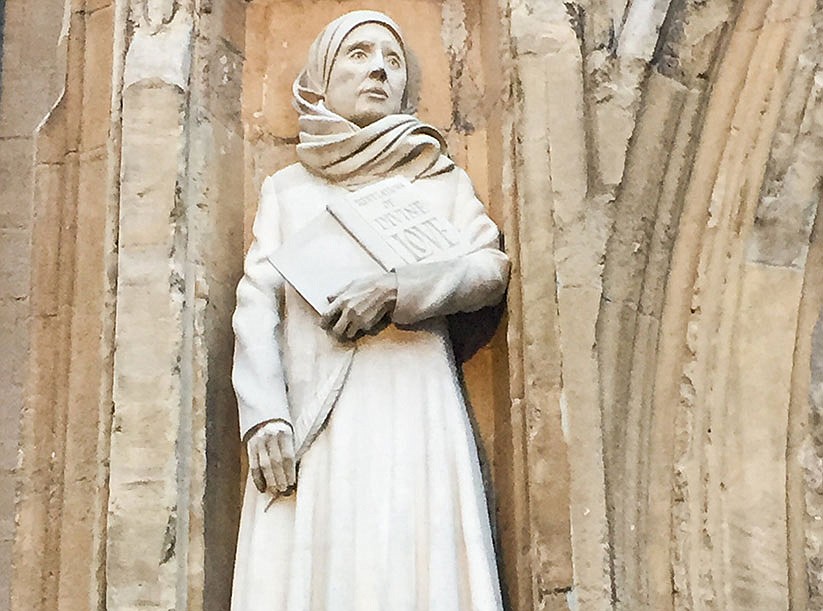Pope praises Julian of Norwich as example of faith and service
May 17, 2023 at 3:57 p.m.

Faith and service, he said, "are timeless truths underpinning not only the life of Christian discipleship but the very fabric of a just and fraternal society."
Pope Francis' message about the ongoing relevance of the medieval mystic was read May 14 at the Anglican cathedral in Norwich, England, during an ecumenical service marking the 650th anniversary of the "shewings" or visions and revelations Julian received in Norwich over several days and nights in May 1373.
Noting how Julian of Norwich's life and writings are "increasingly being acknowledged and celebrated," Pope Francis said that "her maternal influence, humble anonymity and profound theological insights stand as timely reminders" of the importance of faith in God and assisting one another.
[[In-content Ad]]
The mystic's real name is not known; she is called Julian because she lived in a cell at the Church of St. Julian, praying and receiving visitors who asked for help.
Pope Francis praised her "generosity in welcoming those who sought spiritual counsel and encouragement," saying, "this willingness to sacrifice self-convenience for the sake of others is especially needed in responding to the endemic problems of isolation and loneliness felt by so many in the more materially affluent nations of the world."
"It is my hope that through a greater appreciation of the life of Mother Julian, Christians today will be encouraged to follow ever more faithfully and joyfully the example of Jesus, the one who came 'not to be served but to serve,'" the Pope wrote.
Julian of Norwich is best known for her book, "Revelations of Divine Love," and Pope Francis said its message of "God's mercy and compassion" is vital for the world today.
Julian wrote that "she was taught through God's grace that, despite the presence of evil in our midst, 'all manner of thing shall be well,'" the Pope said. "In this regard, I pray that all who face the pressing challenges of war, injustice, ecological disaster or spiritual poverty may be consoled and strengthened by these enduring words of wisdom."
In December 2010, Pope Benedict XVI devoted an audience talk to Julian of Norwich, particularly mentioning how "with a certain audaciousness, she does not hesitate to compare God's love to a mother's love. This is one of the most characteristic messages of her mystical theology: the tenderness, the concern and the sweetness of God's goodness are so great that they evoke a mother's love for her children."
In March 2016, at his general audience during Holy Week, Pope Francis told the crowd that Jesus' willingness to suffer and die is "a great mystery of love and mercy. Our words are poor and insufficient to express it fully," but the Julian of Norwich meditations on "the meaning of merciful love" can help.
Related Stories
Tuesday, December 23, 2025
E-Editions
Events
Faith and service, he said, "are timeless truths underpinning not only the life of Christian discipleship but the very fabric of a just and fraternal society."
Pope Francis' message about the ongoing relevance of the medieval mystic was read May 14 at the Anglican cathedral in Norwich, England, during an ecumenical service marking the 650th anniversary of the "shewings" or visions and revelations Julian received in Norwich over several days and nights in May 1373.
Noting how Julian of Norwich's life and writings are "increasingly being acknowledged and celebrated," Pope Francis said that "her maternal influence, humble anonymity and profound theological insights stand as timely reminders" of the importance of faith in God and assisting one another.
[[In-content Ad]]
The mystic's real name is not known; she is called Julian because she lived in a cell at the Church of St. Julian, praying and receiving visitors who asked for help.
Pope Francis praised her "generosity in welcoming those who sought spiritual counsel and encouragement," saying, "this willingness to sacrifice self-convenience for the sake of others is especially needed in responding to the endemic problems of isolation and loneliness felt by so many in the more materially affluent nations of the world."
"It is my hope that through a greater appreciation of the life of Mother Julian, Christians today will be encouraged to follow ever more faithfully and joyfully the example of Jesus, the one who came 'not to be served but to serve,'" the Pope wrote.
Julian of Norwich is best known for her book, "Revelations of Divine Love," and Pope Francis said its message of "God's mercy and compassion" is vital for the world today.
Julian wrote that "she was taught through God's grace that, despite the presence of evil in our midst, 'all manner of thing shall be well,'" the Pope said. "In this regard, I pray that all who face the pressing challenges of war, injustice, ecological disaster or spiritual poverty may be consoled and strengthened by these enduring words of wisdom."
In December 2010, Pope Benedict XVI devoted an audience talk to Julian of Norwich, particularly mentioning how "with a certain audaciousness, she does not hesitate to compare God's love to a mother's love. This is one of the most characteristic messages of her mystical theology: the tenderness, the concern and the sweetness of God's goodness are so great that they evoke a mother's love for her children."
In March 2016, at his general audience during Holy Week, Pope Francis told the crowd that Jesus' willingness to suffer and die is "a great mystery of love and mercy. Our words are poor and insufficient to express it fully," but the Julian of Norwich meditations on "the meaning of merciful love" can help.









